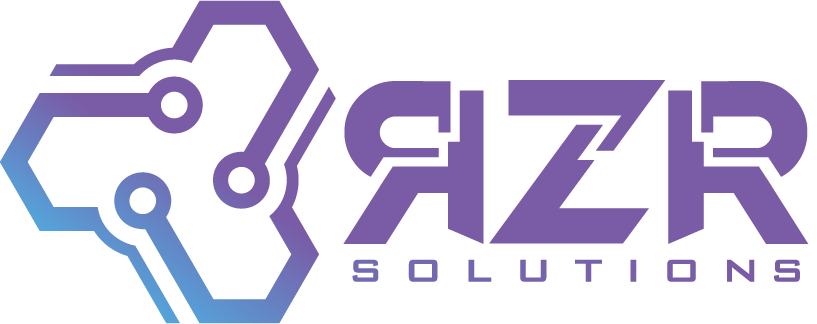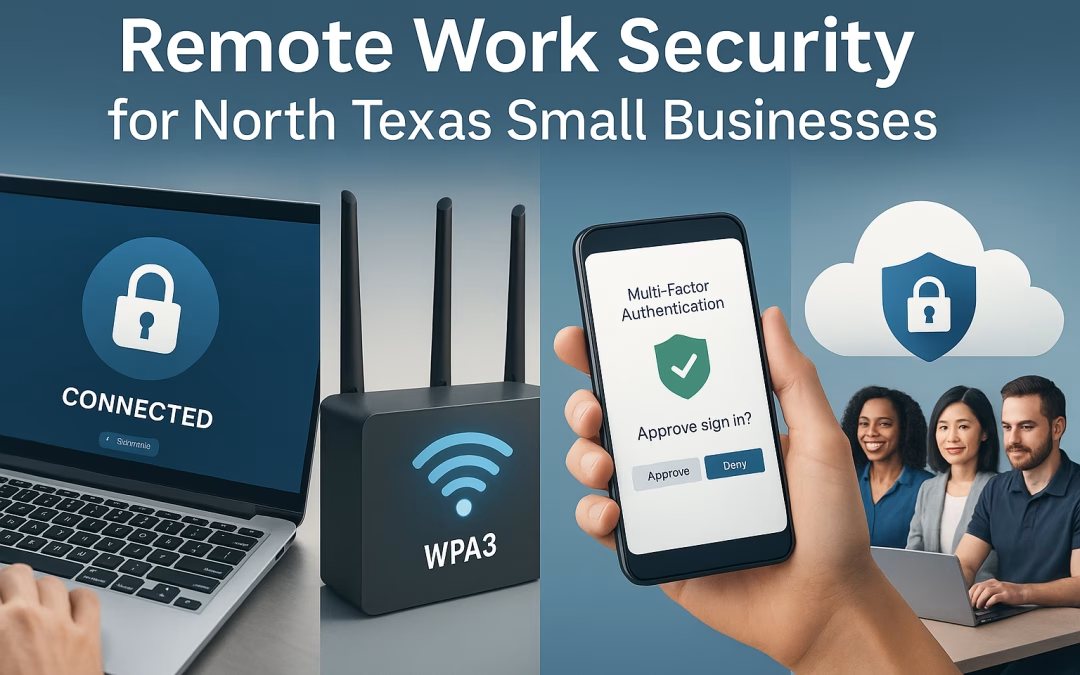Remote work security for North Texas small businesses is the focus of this guide.
Why Remote Work Security Matters
Running a small business in North Texas comes with its unique set of challenges, especially when it comes to IT. Many entrepreneurs find themselves juggling multiple software solutions, while grappling with cybersecurity threats and the complexities of remote work. Are you struggling to manage your team’s productivity from afar, or worried about the vulnerabilities of your network? You’re not alone.
Every day, small businesses face the daunting task of securing sensitive data and ensuring seamless communication among dispersed teams. That’s where RZR Solutions steps in. We specialize in tailored IT solutions designed specifically for small businesses, providing the support you need to navigate these complexities with confidence. From implementing strong cybersecurity measures to optimizing remote workflows, we empower you to focus on what you do best—growing your business—while we handle the tech. Discover how RZR Solutions can transform your IT challenges into a streamlined, secure framework that fosters success.
VPN Setup and Best Practices
Choose Secure Protocols (OpenVPN, IKEv2)
Virtual Private Networks (VPNs) have become critical tools for protecting remote work environments, enabling secure connections for distributed teams. The primary purpose of a VPN is to create a safe, encrypted connection between a user’s device and the internet. That protection is even more crucial as remote work becomes common. As of 2023, studies have shown that over 80% of remote workers rely on VPNs to secure their data during remote access (Statista, 2023). This statistic underscores the importance of having robust VPN setups and best practices in place.
When establishing a VPN for your distributed team, the first step is selecting the right VPN service. Organizations should consider providers that offer strong encryption protocols, such as OpenVPN or IKEv2, which are among the most secure options available. RZR Solutions can assist businesses in selecting the right service based on their specific needs and security requirements.
Require MFA and Strong Authentication
Once the VPN service is chosen, the next step involves proper configuration. This process includes setting up secure authentication so only authorized users can access the network. Multi-factor authentication (MFA) adds another layer of security and makes breaches harder. Multi-factor authentication (MFA) can add an additional layer of security, making it more difficult for malicious actors to breach the network. Adopting such security measures not only protects sensitive company data but also increases the overall trust within the organization.
Keep Clients and Firewalls Updated
Another best practice involves regular software updates for the VPN client and firewall settings. Cyber threats evolve rapidly, and keeping security software up to date will guard against vulnerabilities. RZR Solutions can provide ongoing IT support, ensuring that your VPN systems are regularly updated and monitored for potential threats.
Monitor Logs and Unusual Access
Monitoring VPN activity is also essential for maintaining security. Keeping logs of VPN connections can help identify unusual access patterns that might signal a security breach. Organizations should regularly scrutinize these logs. If RZR Solutions is engaged, we can assist in setting up automated monitoring systems that alert in real time to any suspicious activities.
Train Employees on Safe VPN Use
Additionally, employees should be educated on proper VPN usage. RZR Solutions offers training programs that can teach remote workers how to safely connect to the VPN, recognize phishing attempts, and avoid public Wi-Fi vulnerabilities. According to the Cybersecurity & Infrastructure Security Agency, security awareness and safe remote behaviors are essential to reduce risk. By providing training and resources, companies can empower their employees to act as the first line of defense against potential threats.
Use Split-Tunneling Where Appropriate
It is also advisable to implement a split-tunneling option in VPN settings when appropriate. Split-tunneling allows users to choose which applications secure their data through the VPN and which can access the internet directly. This can enhance speed and performance for non-sensitive operations while still maintaining security for sensitive data transfers. Organizations must carefully evaluate which applications to enable in this mode, weighing the risk of exposing certain data versus the performance benefits. For federal guidance on telework patterns and split tunneling, see CISA’s TIC resources here and NIST’s remote access guide SP 800-46.
In conclusion, VPN setup and best practices are essential in ensuring the security of distributed teams in the remote work landscape. By selecting a reliable VPN service, keeping software updated, monitoring activities, educating employees, and considering configuration options like split-tunneling, organizations can significantly bolster their remote work security. RZR Solutions provides comprehensive support in these areas, enabling businesses to focus on their core operations while remaining secure in a challenging digital environment. As remote work continues to grow, employing best practices for VPN usage will protect both company data and employee privacy, ultimately leading to a more secure and resilient organization.
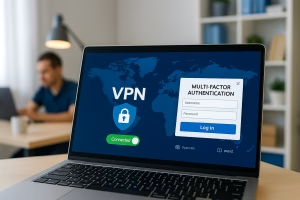
Securing Home Office Networks
Lock Down Wi-Fi (WPA3, Strong Passwords)
As remote work becomes the norm, home office network security is critical. It underpins a secure and efficient operating environment. With a substantial increase in remote teams—according to a Stanford policy brief, approximately 42% of the U.S. workforce was working remotely as of 2020—companies must adapt their cybersecurity strategies to protect sensitive data and maintain operational integrity from various vulnerabilities that come with this transition.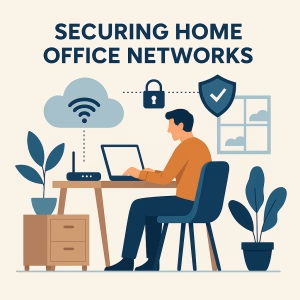
One of the primary concerns for organizations is the fact that home networks are typically less secure than corporate environments. Unfortunately, many remote employees do not implement necessary security measures, which creates openings for cybercriminals to exploit. This reality underscores the need for both companies and employees to prioritize home network security.
Use a VPN for Corporate Access
Effective home office network security starts with the fundamental practice of securing the Wi-Fi network. Employees should change default router credentials and set a strong password. Enable WPA3 encryption if available. These steps help prevent unauthorized access to their networks and, consequently, protect the sensitive data that may flow through these connections. WPA3 details and configuration options are covered in vendor guidance such as Cisco Meraki’s WPA3 guide. RZR Solutions provides comprehensive guidance and support for organizational teams to implement these security measures, ensuring that employees understand the importance of securing their home Wi-Fi and how to go about it effectively.
Automate Updates and Patching
Another critical aspect of home office security is the use of Virtual Private Networks (VPNs). VPNs create secure encrypted tunnels for data to travel between remote employees and the company’s server. A VPN not only protects data from interception during transmission but also masks the user’s IP address, adding an additional layer of privacy. CISA maintains practical tip sheets for safe public Wi-Fi use here. RZR Solutions can facilitate the implementation of VPNs tailored to organizational needs, ensuring employees can work securely while accessing company resources.
Teach Phishing and Safe Browsing
Regular updates and patch management are critical. Many employees overlook OS, app, and security updates, which leaves known exploits open. CISA highlights patching and configuration as key defenses in telework scenarios; see the telework toolkit PDF. Organizations should promote a culture of regular software checks among employees, possibly even providing tools and resources that automate this process. RZR Solutions offers policies and solutions that streamline software maintenance for remote teams, reducing the likelihood of exploitation and exposure to security risks.
Furthermore, employee education plays a significant role in strengthening home network security. Training sessions that cover cybersecurity best practices, phishing awareness, and the importance of secure passwords can dramatically reduce the risks associated with remote work. A 2021 report from IBM found that organizations with robust security training experience lower breach costs; see IBM’s annual report overview here. RZR Solutions emphasizes the significance of ongoing employee training, providing organizations with tailored educational programs and resources to instill a security-first mindset in their remote workforce.
In conclusion, securing home office networks is vital to protecting distributed teams in the remote work landscape. A multifaceted approach incorporating secure Wi-Fi practices, the usage of VPNs, regular software updates, and employee education is imperative for organizations to safeguard their data. By partnering with services like RZR Solutions, organizations can reinforce their security strategies and ensure that their remote employees have the tools, resources, and knowledge necessary to maintain a secure network in their home offices.
Device Management for Remote Workers
Deploy MDM with Remote Wipe & Policies
In an increasingly digital era, the rise of remote work has brought along a unique set of challenges, particularly in device management. Effective device management is pivotal to ensure that the security of a distributed workforce is maintained while allowing for flexibility and productivity. Remote workers use personal devices, company-issued laptops, smartphones, and tablets to access sensitive information. That makes it critical for organizations to implement comprehensive device management strategies.
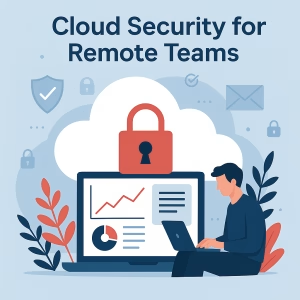 One of the primary concerns in managing devices remotely is the potential for data breaches. According to a report by IBM, companies with remote workers face an 87% higher likelihood of a data breach due to unprotected devices (IBM Security, 2021). To mitigate these risks, organizations need to adopt Mobile Device Management (MDM) solutions and integrate them into their cybersecurity framework. These solutions add device tracking, remote wipe, and policy enforcement. If someone tries to access sensitive data, you can respond fast.
One of the primary concerns in managing devices remotely is the potential for data breaches. According to a report by IBM, companies with remote workers face an 87% higher likelihood of a data breach due to unprotected devices (IBM Security, 2021). To mitigate these risks, organizations need to adopt Mobile Device Management (MDM) solutions and integrate them into their cybersecurity framework. These solutions add device tracking, remote wipe, and policy enforcement. If someone tries to access sensitive data, you can respond fast.
Meet Compliance (HIPAA and More)
Another significant aspect of device management is maintaining compliance with regulatory standards. Each industry has its own set of security regulations, and businesses must ensure all devices are compliant to avoid hefty fines and legal repercussions. For instance, healthcare organizations must comply with HIPAA regulations, which includes securing any devices that process or store patient information. RZR Solutions provides expert guidance in navigating these compliance challenges, helping organizations implement robust device management protocols that keep them compliant while maintaining asset security.
Zero-Trust Access Controls
Furthermore, it’s essential for organizations to equip their remote workers with the necessary tools and knowledge to manage their devices securely. Regular training and updated resources can significantly reduce the risk of human error, which is often the weakest link in cybersecurity. Organizations can develop training modules that cover best practices for device security, focusing on topics like recognizing phishing attempts, using secure connection methods like VPNs, and strong password management. RZR Solutions offers specialized training sessions to empower remote teams with the skills they need to protect their devices and the data they access.
Keep a Live Device Inventory
Implementing a zero-trust security model can also enhance device management for remote workers. In this approach, trust is never assumed based on location—be it in the office or working remotely. Every connection is verified, ensuring that only authorized devices and users can access company data. Adopting this model requires a robust system that continuously monitors devices for security compliance and vulnerability. NIST’s zero trust architecture is documented in SP 800-207. RZR Solutions assists businesses in adapting to a zero-trust architecture, which can dramatically improve device management strategies, thereby reinforcing the security of distributed teams.
Moreover, keeping an inventory of all devices used by remote workers is a critical step in effective management. An inventory helps organizations monitor the performance, security posture, and compliance status of every device. Regular audits can identify devices that may pose security risks, such as those running outdated software or lacking essential security patches. RZR Solutions can help set up efficient monitoring systems to maintain an accurate and up-to-date inventory, which is crucial for managing device lifecycles effectively.
In summary, managing devices for remote workers is a multifaceted approach that requires a blend of technology, training, and robust security policies. Organizations must prioritize device security to fend off threats of data breaches and ensure compliance with regulations. Leveraging services offered by experts like RZR Solutions can help businesses streamline their device management processes, enabling a secure and efficient remote working environment that enhances productivity without compromising security. By investing in the right tools and training, organizations can empower their distributed teams while safeguarding sensitive information against potential threats.

Cloud Security for Remote Teams
Harden Access with MFA
In today’s fast-paced business environment, the concept of remote work has matured from a temporary solution to a permanent workforce strategy. This shift has elevated the importance of cloud security, especially as teams increasingly rely on cloud-based tools for collaboration and communication. According to a study by Gartner, many organizations are shifting to cloud-centric security because of its agility and effectiveness in addressing remote work challenges.
Encrypt Data In Transit and At Rest
Cloud security for remote teams encompasses a variety of practices and technologies designed to safeguard data, applications, and infrastructures stored in the cloud. This is particularly vital as employees access sensitive business information from various locations and devices. One critical aspect of cloud security is the implementation of strong access controls. Organizations must adopt solutions like multifactor authentication (MFA) to ensure that only authorized users can access corporate resources. By providing an additional layer of security, MFA can significantly reduce the risk of unauthorized access and data breaches. For small-business guidance on turning on MFA, see CISA’s resources here.
Continuous Monitoring & User Training
Another vital component of cloud security is data encryption. When data is encrypted, even if it is intercepted during transmission, it remains unreadable without the appropriate decryption key. Research shows that an estimated 90% of data breaches occur due to weak or stolen credentials. Therefore, investing in effective encryption technologies is essential for remote teams which often exchange sensitive information over unsecured networks.
Adopt a Zero-Trust Model
RZR Solutions offers comprehensive cloud security services tailored to meet the needs of organizations with distributed teams. By partnering with RZR Solutions, organizations can implement robust security frameworks that incorporate best practices in cloud security, ensuring that their remote workforce can operate securely and efficiently. These frameworks include the regular assessment of security protocols, employee training on cybersecurity best practices, and continuous monitoring of the cloud environment for potential threats.
As more businesses adapt to this new normal of remote work, the rise of sophisticated cyber threats poses a significant challenge. Cybercriminals are increasingly targeting remote workers, leveraging tactics such as phishing attacks that exploit human vulnerabilities. A recent IBM study shows breach costs remain high; see the latest figures here. This indicates a growing need for companies to enhance cloud security measures proactively.
To combat these threats effectively, organizations must create a culture of cybersecurity awareness among their remote employees. RZR Solutions emphasizes the importance of regular training sessions and updates on the latest cyber threats and trends. Empowering employees with knowledge helps them better recognize suspicious activities or phishing attempts, thereby reducing the likelihood of falling victim to such schemes.
Additionally, organizations should consider adopting a zero-trust security model. This approach dictates that no user—whether inside or outside the organization—is trusted by default. Instead, all access requests are thoroughly verified before granting permissions. Implementing a zero-trust framework can significantly enhance security, especially for remote teams that operate increasingly in a perimeter-less security environment. See NIST’s zero-trust guidance SP 800-207.
To conclude, as remote work becomes a staple across various industries, the need for robust cloud security for distributed teams has never been more critical. By investing in comprehensive security solutions, including MFA, data encryption, and continuous training, organizations can safeguard their digital assets. RZR Solutions can assist in developing and implementing a secure cloud infrastructure, enabling companies to focus on their core business while their remote teams work securely and efficiently. With proper cloud security measures in place, organizations can transition confidently into this new era of work.
Training Remote Employees on Security
Make Training Interactive and Ongoing
In today’s work environment, remote teams are becoming increasingly common. With this shift, organizations face unique challenges related to cybersecurity. One of the most crucial aspects of maintaining a secure remote workforce is comprehensive security training for employees. As employees transition from traditional office settings to remote work, they must be equipped with the knowledge and tools necessary to protect sensitive information and maintain the integrity of the company’s digital infrastructure.
Research conducted by IBM shows that human error accounts for a large share of cybersecurity breaches. This underscores the need for thorough security training for remote employees. Organizations must prioritize educating their workforce about various security threats such as phishing attacks, data breaches, and unclear practices around handling sensitive information. For example, remote workers might inadvertently expose company data while using unsecured Wi-Fi networks or sharing devices with family members, leading to potential vulnerabilities.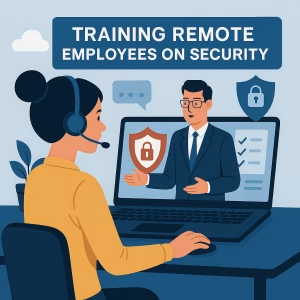
Reinforce Passwords and MFA
Security training for remote employees should be comprehensive and ongoing. It is not enough to conduct a single training session. Organizations should implement regular refresher courses and updates on the latest security threats. RZR Solutions offers tailored security training programs that cover a wide range of topics, including password management, recognizing phishing attempts, and safe browsing practices. These programs can help maximize employee awareness and encourage a culture of security within the organization. For practical MFA “how-to” guidance, see CISA’s tips here.
Clarify Incident Reporting Paths
One effective approach to training remote teams is through interactive and hands-on learning. Traditional lecture-style training may not resonate with employees who are working from home. Engaging training formats, such as simulations, quizzes, and real-life scenarios, help reinforce the material and make it more applicable to their daily activities. RZR Solutions can create customized training modules that incorporate interactive elements, ensuring that remote employees are fully engaged and absorbing the critical information.
Build a Security-First Culture
Another important aspect of training is to emphasize the importance of basic security hygiene. Employees must understand the significance of strong password practices, such as using multi-factor authentication (MFA) and creating unique passwords for different accounts. By incorporating these principles into the training, organizations can bolster their remote security posture significantly.
Additionally, establishing clear communication guidelines is vital for remote employee training. Employees should know whom to contact in case of a security incident, the steps to take when they suspect a breach, and how to report potential vulnerabilities. RZR Solutions can assist in developing a clear response plan and communication framework, ensuring that employees are not left in the dark when dealing with security concerns.
It’s also beneficial to foster a culture of security awareness among remote teams. Continuous support from management to cultivate this mindset can significantly enhance the overall security framework. Regularly communicating security updates, sharing best practices, and celebrating milestones in security achievements can reinforce the importance of these initiatives.
In conclusion, training remote employees on security is essential for protecting sensitive organizational data and maintaining a robust cybersecurity posture. With 95% of breaches attributed to human error in many analyses, a structured educational approach must be adopted that incorporates interactive training, emphasizes security hygiene, and establishes clear communication protocols. RZR Solutions is committed to providing comprehensive training programs that empower remote teams, ensuring they are well-prepared to face potential cybersecurity challenges head-on. By investing in their workforce’s security education, organizations can significantly minimize risks and enhance their overall security landscape.
Conclusion
Remote work security ties these practices together. In summary, remote work security is paramount for protecting a distributed team. Implementing a comprehensive security strategy that includes strong password policies, regular software updates, and employee training can drastically reduce vulnerabilities. Establishing secure communication channels and utilizing VPNs further safeguard sensitive information. Additionally, fostering a culture of security awareness among team members is essential for maintaining vigilance against potential threats. By prioritizing these measures, organizations can create a secure remote working environment that promotes productivity while mitigating risks.
Need IT Solutions?
Call: 972-904-1559 • Book Consultation
